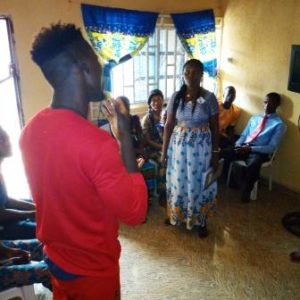
President of D-Ability Initiative and some of the beneficiaries
Project Title: Improving Livelihood Outcomes for Deaf women and girls in Obio/Akpor Local Government Area (OBALGA) of Rivers State, Nigeria.
Project Duration: 9 months (February- October 2022)
Funded by the European Union, through the British Council’s Agents for Citizen-Driven Transformation (ACT) Programme.
The Goal: to Improve financial independence for Deaf women and girls in Rivers State, Nigeria.
Deaf women and girls in OBALGA live in extreme poverty. These women and girls find it challenging to earn a living. Those living with partners or children cannot contribute financially to the sustenance of their household. The poverty cycle has continued within the Deaf community.

D-Ability Initiative’s President Sensitising the Deaf Women and Girls during the Flag-off Ceremony
Disability brings additional undesirable consequences in Nigeria. So far, it is sad to note that there are few policies and programmes geared toward enabling Persons with Disabilities (PWDs) to gain employment. Since most of them are not educated, living with disability, without skills, in the face of unprecedented unemployment and COVID-19 is critical.
Our Organisation’s mission is to support, empower, and build the capacity of the Deaf and Hard of hearing persons so that they can compete favourably with the hearing persons and have meaningful lives. Empowering them will make a difference.
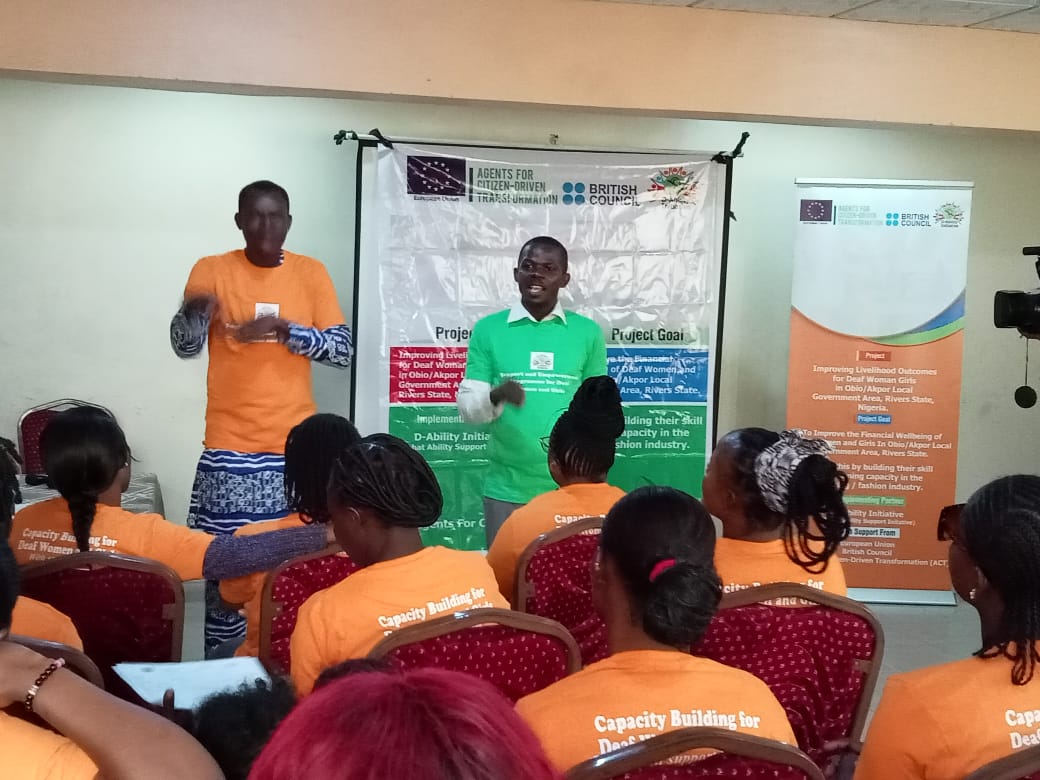
D-Ability Initiative’s President Sensitising the Deaf Women and Girls during the Flag-off Ceremony
This project addresses the issues of gender and social inclusion. Traditionally and culturally, women are less preferred. Persons with hearing disabilities (Deafness) are the most ignored and ridiculed. Therefore, this project focuses on enabling Deaf women and girls to gain financial independence and compete with the male, and other women and girls without disabilities. It will reduce the inequality rate.
The European Union and the British Council through the Agents for Citizen-Driven Transformation (ACT) Programme are poised to contribute to more inclusive, effective, accountable, and gender-responsive development in Nigeria. They are also strengthening the system of Civil Society Organisations (CSOs), to improve their internal, external, and programmatic capabilities. We are deeply grateful that our Organisation is promoting inclusion, gender equity, and responsiveness.
The President of D-Ability Initiative, Dr. K. U. Nwanyanwu stressed the need for the beneficiaries to take the skill-building programme very seriously, noting that the European Union, and the British Council, through the Agents for Citizen-Driven Transformation (ACT) have shown interest in their welfare by funding their capacity-building programme. They also need to prove their worthiness of such an investment.

D-Ability Initiative’s President Sensitising the Deaf Women and Girls during the Flag-off Ceremony
Thank you European Union, British Council, and the Agents for Citizen-Driven Transformation (ACT). You made it happen!
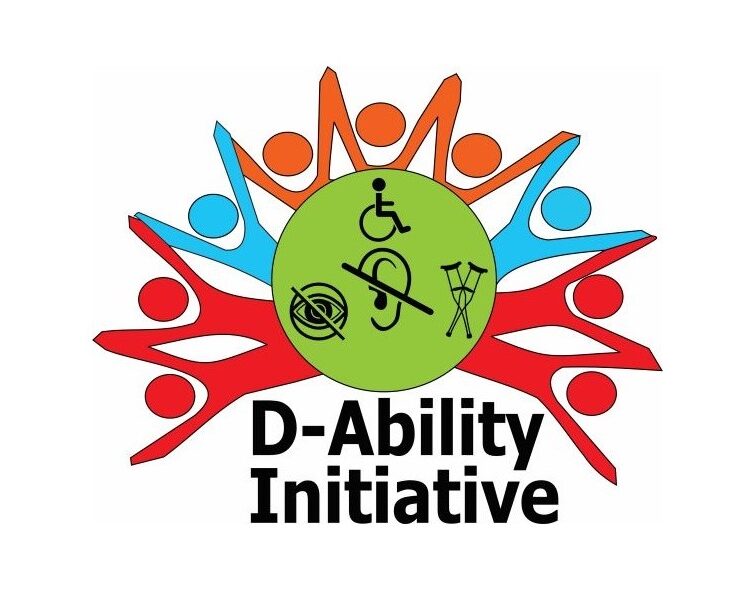
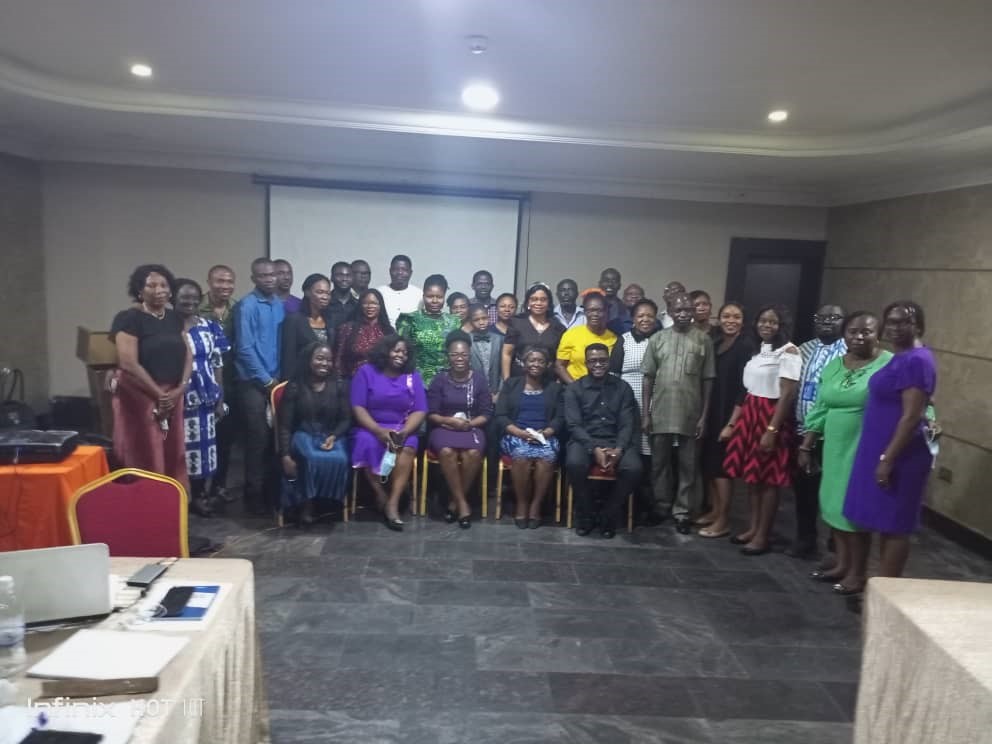

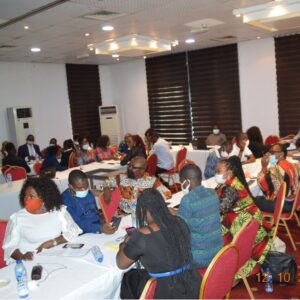 management alongside other CSOs partners in Rivers State. The three days training program held at Novotel Hotel, Port-Harcourt was part of the capacity strengthening programme for selected organizations in Rivers State. The intensive training was facilitated by Mrs. Folake Okonubi who took the participants through several modules as designed for the training. It was interesting, impactful, and all-inclusive as she never shifted focus on Human Resources with the introduction of each module demonstrating expertise in the field.
management alongside other CSOs partners in Rivers State. The three days training program held at Novotel Hotel, Port-Harcourt was part of the capacity strengthening programme for selected organizations in Rivers State. The intensive training was facilitated by Mrs. Folake Okonubi who took the participants through several modules as designed for the training. It was interesting, impactful, and all-inclusive as she never shifted focus on Human Resources with the introduction of each module demonstrating expertise in the field.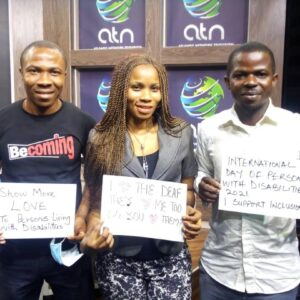


 This high-profile feedback workshop was for Executive Directors only. D-Ability Initiative and other selected CSOs together with the officials of the European Union (EU), British Council, and Agents for Citizens-Driving Transformation (ACT) held a feedback session on the EU-ACT series of programmes in Rivers State. The feedback session summarized the months-long organizational capacity development program and heard from participants about the success of programmes so far. It also created an avenue for the Executive Directors to suggest possible ways of making the training better, more productive, interactive, and generally more conducive. This was necessary, as the CSO leaders understand their operational terrain and hence could suggest what would work best. The EU-ACT team from Abuja joined the Rivers State Focal person, Temple Oraeki in the feedback session. The EU-ACT delegation used the opportunity to announce the commencement of phase two of the program which focuses on strengthening the regulatory framework so that civil society organisations can operate in a friendly regulatory environment while staying compliant with the requirements of concerned regulatory bodies such as Economic and Financial Crimes Commission (EFCC), Corporate Affairs Commission (CAC), Federal Inland Revenue Services (FIRS), State Revenue Services, among others. Dr. Nwanyanwu the Executive Director of D-Ability initiative represented the Organization, along with the Executive Directors of other selected EU partner CSOs.
This high-profile feedback workshop was for Executive Directors only. D-Ability Initiative and other selected CSOs together with the officials of the European Union (EU), British Council, and Agents for Citizens-Driving Transformation (ACT) held a feedback session on the EU-ACT series of programmes in Rivers State. The feedback session summarized the months-long organizational capacity development program and heard from participants about the success of programmes so far. It also created an avenue for the Executive Directors to suggest possible ways of making the training better, more productive, interactive, and generally more conducive. This was necessary, as the CSO leaders understand their operational terrain and hence could suggest what would work best. The EU-ACT team from Abuja joined the Rivers State Focal person, Temple Oraeki in the feedback session. The EU-ACT delegation used the opportunity to announce the commencement of phase two of the program which focuses on strengthening the regulatory framework so that civil society organisations can operate in a friendly regulatory environment while staying compliant with the requirements of concerned regulatory bodies such as Economic and Financial Crimes Commission (EFCC), Corporate Affairs Commission (CAC), Federal Inland Revenue Services (FIRS), State Revenue Services, among others. Dr. Nwanyanwu the Executive Director of D-Ability initiative represented the Organization, along with the Executive Directors of other selected EU partner CSOs.




